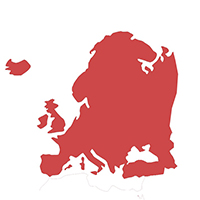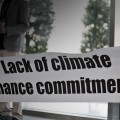Bonn: War of the Worlds
Jayden Holmes | June 6, 2015.
On the fifth day of the 2015 United Nations climate change conference in Bonn, negotiations on the Paris agreement began officially. The principle of ‘common but differentiated responsibility’ (CBDR) quickly became a sticking point, re-opening an age-old debate between developed and developing countries. The principle of CBDR was first adopted during the 1992 Earth Summit in Rio De Janeiro, where the United Nations Framework Convention on Climate Change (UNFCCC) came into being.
The European Union (EU) is pushing for a “more nuanced understanding” of CBDR, which goes beyond a binary understanding of the world based on the historical context in which the UNFCCC was founded. This historical context has resulted in an overly-simplistic split of states into groups based on their stage of development in the early 1990s. During a press conference in Bonn, EU spokesperson Elina Bardram argued that: “we need to reflect today’s realities,” rather than working with a concept of differentiation that is “still prefaced on extreme definitions based on two categories”.
The EU feels that a breakthrough on CBDR came during the Warsaw conference in 2013, when countries were called upon to put forward Intended Nationally Determined Contributions (INDCs). In offering a “vehicle for self-differentiation”, INDCs are helping the world move to towards a more collaborative and inclusive climate agreement. For the EU, further progress on CBDR came last year in Lima, where the final text encouraged countries to view their responsibilities “in light of national circumstances”.
Meanwhile, many developing countries reject the subtext of EU and other developed country claims. Meena Raman of the Third World Network told the press that: “there is a paradigm war going on… developed countries want to consider developing and developed counties the same—they want to kill CBDR”.
According to the Third World Network, the developing world is disappointed that developed countries are not looking at factors other than mitigation when submitting their INDCs. Many developing countries would like to see consideration of adaptation, finance and technology transfer in all INDCs (whilst not diluting important mitigation action). These elements are required so that developing countries can realise their own mitigation potential, in a way that will not hinder development agendas.
By expecting solid mitigation efforts from the developing world without committing to finance and technology transfer, Raman argues that developed countries are “dooming the poor to be poor forever”.
The problem emerging with the voluntary and vague nature of INDCs is that countries can decide individually how they wish to view them—there is no common ground. While happy to commit what resources they can to climate action, developing countries feel that the bulk of efforts to reduce greenhouse gas emissions should come from developed countries (who have historically contributed more to causing climate change).
The Climate Action Network (CAN), representing non-governmental organisations, feels that self-differentiation in the INDC process is leading to a lack of ambition, while slowing progress on a post-2020 climate agreement. During a side event on Equity Assessment, Ambition Cycles and the INDCs, CAN argued that an “ambition ratcheting mechanism” is required to allow countries to increase their efforts at five to ten year review review periods.
Though alongside ambition, Raman says equity needs to be brought into the INDC discussion: “you can’t have one without the other”. Equity is essential to ensuring a fair and balanced Paris agreement, which works for all involved.
The argument over CBDR is not a new one. EU negotiator Geert Fremout said that: “differentiation and equity are the key issues underlying these negotiations, even if not always expressed directly”.
Chances of solving this ongoing debate here in Bonn currently look slim. As put by the EU’s Bardram: “We shouldn’t expect a major breakthrough, although progress can be made”.
Photo: UNFCCC
The Verb will be on the ground in Bonn to cover the UN climate change conference as it unfolds over 1-11 June 2015.













comment